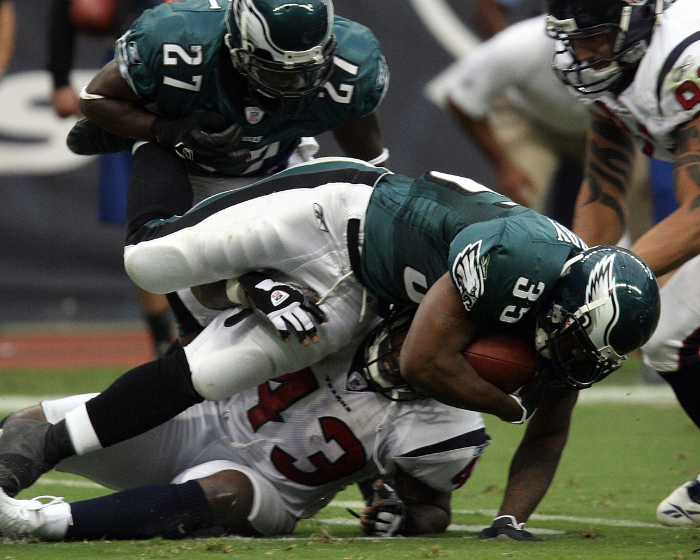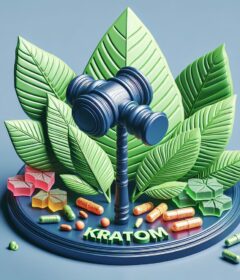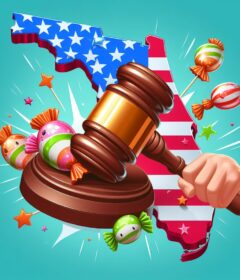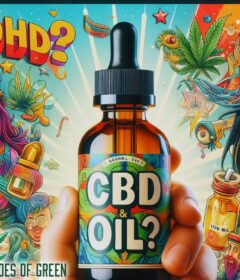NFL will spend $1 million to study CBD and THC for sports-related injuries including concussion

NFL Greets CBD
The National Football League is awarding $1 million to two medical teams researching the ability of CBD and THC to aid various sports-related injuries, the Associated Press reports.
One team will investigate whether cannabinoids relieve pain or speed recovery after injury to muscles, ligaments or tendons. The other will examine whether cannabinoids ease pain from concussion, and whether they offer any preventative protection from concussion.
“We’re always interested in trying to improve our approach and our treatment for acute and chronic pain in NFL players, and we always want to make sure that our players are receiving the most up-to-date medical consensus around any of these treatments,” NFL chief medical officer Dr. Allen Sills told The Associated Press. “[…] Anytime we want to introduce a new therapy, we have to understand how that decision might impact their well-being and their performance. We know there’s been a lot of interest in this area, but we did not feel like there was a lot of great solid research on the benefits of marijuana, CBD and treating acute and chronic pain. So, that’s why we wanted to try to contribute to the body of science in this area.”
The NFL announced the awards Feb. 1, noting that the studies won’t be done on NFL players. Instead, elite athletes outside of the NFL will participate in the studies.
“We know there’s been a lot of interest in this area, but we did not feel like there was a lot of great solid research on the benefits of marijuana, CBD and treating acute and chronic pain. So, that’s why we wanted to try to contribute to the body of science in this area.”
— Dr. Allen Sills, NFL Chief Medical Officer
Study 1: Cannabinoids for Injury to Muscles, Tendons and Ligaments
The first study will investigate the effects of cannabinoids for pain management and recovery from sports-related injury to soft tissue. The randomized clinical trial will be led by two doctors at the University of California San Diego, Thomas Marcotte and Mark Wallace.
They’ll be evaluating each of the following in terms of how well they relieve pain from damage to muscles, ligaments and tendons:
– Delta-9 THC
– CBD
– Combined THC-CBD
– A placebo effect
The athletes will use vaporizers to inhale the treatments after a game-related injury. The results will be monitored with remote phone apps.
The research team has decades of experience in clinical cannabis research, and will have access to UCSD’s Center for Medicinal Cannabis Research for lab space and equipment.
“Our team is excited to receive this funding to conduct a systematic, ‘real-world, real-time’ study with professional athletes, and which should shed further light upon the many anecdotal reports that cannabis is helpful in reducing post-competition pain,” said Dr. Mark Wallace, co-principal investigator and director of the Center for Pain Medicine at UC San Diego Health.
Because there is little medical research in this area, the findings from this study will offer preliminary data on cannabinoids’ ability to help sports-related injuries and inform future studies regarding study design and implementation challenges.
Study 2: Cannabinoids and Concussion
The second study will test whether cannabinoids offer neuroprotection from concussion, and whether they can be used for pain management after head injuries. Leading the project is Dr. J. Patrick Neary, an exercise physiologist and professor in the Faculty of Kinesiology and Health Studies at the University of Regina.
Neary’s research team is comprised of cerebrovascular and neuro-physiologists, clinical psychologists, pharmacokineticists, and physicians from the Universities of Regina, Saskatchewan, and British Columbia in Canada. They have extensive experience in both concussion pathology and medical cannabis research.
Neary hopes to determine whether cannabinoids including CBD and THC are effective as an alternative or supplement to prescription medications used after concussions, including opioids. Neary’s team will also assess the neuroprotective properties of cannabinoids, checking to see whether they reduce the incidence or severity of concussion in contact sports.
“The prevention and treatment of concussions is at the core of my research,” said Dr. Neary. “That’s why I am excited to have the support of the NFL on this project. Our interdisciplinary research team believes that different cannabinoid formulations found in medical cannabis have the potential to benefit athletes suffering from the acute and long-term chronic effects of concussions. Our research will also work to show that cannabinoids can be used as an alternative to opioids for pain management. Ultimately, this study has the potential to change not only the lives of current and former NFL players, but also the lives of anyone who may suffer from a concussion.”
“Ultimately, this study has the potential to change not only the lives of current and former NFL players, but also the lives of anyone who may suffer from a concussion.”
— Dr. Patrick Neary, Exercise Physiologist and Professor in the Faculty of Kinesiology and Health Studies at the University of Regina
How The Studies Were Chosen
These studies were selected from 106 proposals submitted to the NFL and the NFL Players Association’s Joint Pain Management Committee.
The Pain Management Committee made its call for research proposals in June 2021.
”The NFL-NFLPA Joint Pain Management Committee is thrilled with the results of this process. We received over 100 proposals from top clinicians and researchers from around the world,” said Dr. Kevin Hill, co-chair of the NFL-NFLPA Joint Pain Management Committee, director of addiction psychiatry at Beth Israel Deaconess Medical Center and associate professor of psychiatry at Harvard Medical School. “The NFL is eager to advance the science of pain management and performance in an effort to improve the health and safety of the players.”







